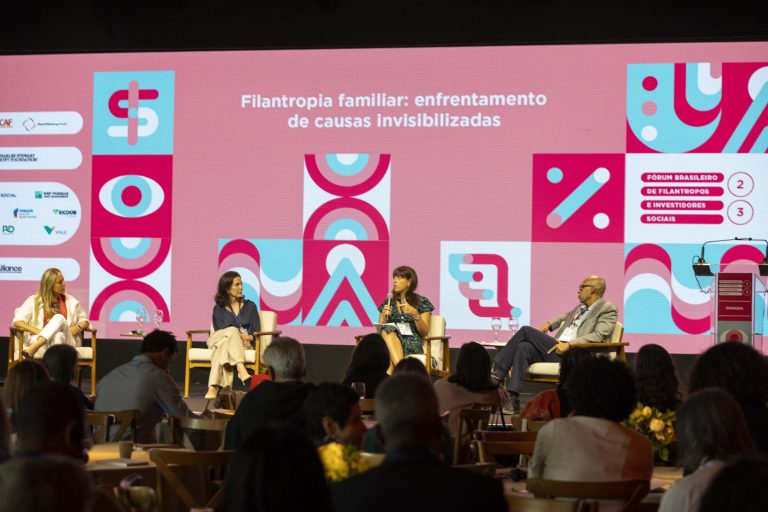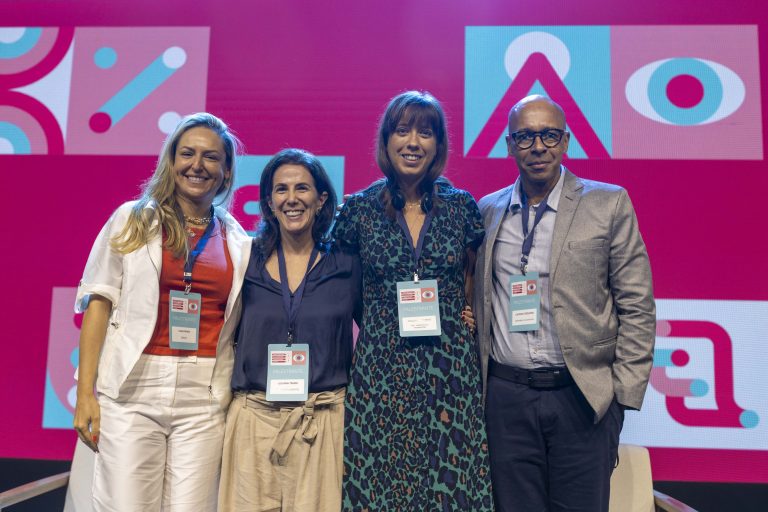By Isadora Pagy, Project Analyst at IDIS
When we talk about philanthropy, it is common to think of donations made for causes like education, healthcare, and hunger relief. The first image that often comes to mind is that of vulnerable children in need of help. It’s no wonder that children’s causes received the most donations in 2022, representing 46% of donations made in the past year, according to Brazil Giving Research 2022 coordinated by IDIS.
Despite the great importance and urgency of such issues, others end up receiving less attention, becoming overlooked causes. This underscores the need for us to be bold in bringing visibility to and prioritizing these topics, regions, and organizations. This is especially true when it comes to family philanthropy, which has become increasingly strategic, going beyond isolated or charitable actions, and holding great potential for transformation.
 Such boldness was the overarching theme of the Brazilian Philanthropy Forum 2023, which took place on September 14th. During the event, a session was held to discuss precisely Family Philanthropy and addressing invisible causes, featuring the presence of Ilana Minev, Chairwoman of the Board of Directors of Bemol, Luciana Temer, CEO of Instituto Liberta and a board member of the Movimento Bem Maior, Philippine Vernes, Senior Manager of International Partnerships at CAF, and as the moderator, Luciano Cerqueira, Project Coordinator at Samambaia Filantropias.
Such boldness was the overarching theme of the Brazilian Philanthropy Forum 2023, which took place on September 14th. During the event, a session was held to discuss precisely Family Philanthropy and addressing invisible causes, featuring the presence of Ilana Minev, Chairwoman of the Board of Directors of Bemol, Luciana Temer, CEO of Instituto Liberta and a board member of the Movimento Bem Maior, Philippine Vernes, Senior Manager of International Partnerships at CAF, and as the moderator, Luciano Cerqueira, Project Coordinator at Samambaia Filantropias.
 During the conversation, Luciana Temer, who works to raise awareness about combating child sexual abuse as the director at Instituto Liberta, commented on how many investors and companies lack interest in investing in this cause because they consider it “an ugly issue.” In other words, they do not want to associate their brand with the cause. This raises a discussion about social washing and the tendency to invest only in issues that are “trendy” in order to enhance brand value in the eyes of consumers and potential investors.
During the conversation, Luciana Temer, who works to raise awareness about combating child sexual abuse as the director at Instituto Liberta, commented on how many investors and companies lack interest in investing in this cause because they consider it “an ugly issue.” In other words, they do not want to associate their brand with the cause. This raises a discussion about social washing and the tendency to invest only in issues that are “trendy” in order to enhance brand value in the eyes of consumers and potential investors.
Temer compares the issue to the fight against violence against women, which was also not discussed because it was considered a matter to be dealt with privately, as the saying goes, “you shouldn’t meddle in a husband and wife’s quarrel.” She emphasizes that this mindset should be challenged and that child sexual abuse, like violence against women, “occurs within families, is silenced, and exists in all social classes.”
Despite their importance, these overlooked causes are often considered residual and non-structural, which is once again used as a justification for not taking these issues seriously and strategically. This creates a greater difficulty in engaging partners, requiring boldness to address such socio-environmental issues.
In addition to Luciana Temer’s cause, there are other equally overlooked ones. Ilana Minev works on socio-environmental issues in the Amazon region and discusses the challenges and unique aspects of working in this region. She mentions that “when you work alone, you have limitations in terms of resources, time, and engagement,” emphasizing the importance of collaborative work, one of the pillars of her approach, by cooperating with other organizations also operating in the region.
 Minev emphasizes another specific characteristic of the territory, stating that “most people have a helicopter view of the Amazon. They look through the treetops and see everything as green and rivers. But it’s necessary to descend and delve into the roots and look at the 25 million people who live there and seek prosperity”. She speaks of the potential that the region holds and the importance of working in-depth, once again combatting social washing.
Minev emphasizes another specific characteristic of the territory, stating that “most people have a helicopter view of the Amazon. They look through the treetops and see everything as green and rivers. But it’s necessary to descend and delve into the roots and look at the 25 million people who live there and seek prosperity”. She speaks of the potential that the region holds and the importance of working in-depth, once again combatting social washing.
When it comes to territory, Luciano Cerqueira highlights another obstacle that the country faced in the past, which was the perception of funders and international organizations towards Brazil as a whole, not just the Amazon. He comments on how Brazil was seen as a rich yet unequal country, with the means to finance social causes, which led to the departure of major international funders in 2004. Luciano discusses how this perception has changed and how international organizations have started to see new partnership possibilities with Brazil, bringing a positive outlook for Brazilian organizations.
Despite the challenges raised, there are opportunities for family philanthropy to become increasingly strategic. Philippine Vernes, representing CAF, a century-old British philanthropy organization, discusses the intergenerational aspect and the transfer of wealth to future generations, which opens doors to new themes, ways of giving, and strengthening the third sector.
Therefore, there is a need to focus on institutional strengthening of organizations, looking at governance and resource mobilization. This way, private social investment can be powerful, long-lasting, collaborative, and contribute to various social causes and territories across the country, bringing visibility to all.
Check out the full session.



